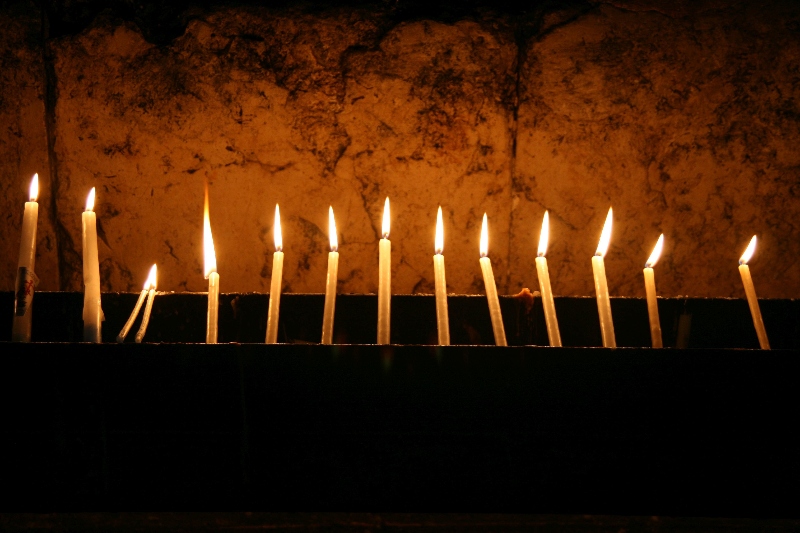Complexity in solidarity
Some of my Jewish friends find Christian Zionism as problematic as I do. But to minimise the significance of what is the largest loss of Jewish life since the Second World War is to be guilty of a terrible hypocrisy, writes Ian Stackhouse

Forty years ago, on my 19th birthday as it happens, I touched down at Ben Gurion Airport to begin a six month scholarship with The Friends of Israel, working in a High School in Ashkelon for a couple of months, before moving north to a kibbutz near Tiberius.
Having just come to Christian faith a year earlier, you can imagine how impressionable I was. I have carried some of those images with me ever since, not just the obvious ones like the Sea of Galilee, but the less familiar places like Wadi Qelt, which I trekked again, back in January this year, as a kind of pilgrimage to the faithfulness of God in keeping me all this time. Indeed, the walk inspired a whole series of reflections that I wrote up during my sabbatical this summer, and which will be published soon, entitled Beyond Christian Zionism (Cascade, an imprint of Wipf and Stock, 2024).
I may as well say now that the book tracks my journey from the heady days of the early 80s when being an evangelical and pro-Zionist was practically synonymous, to a situation now where the welding together of Christian faith with the expansionist agenda of the Israeli right-wing has become, for people like me, highly problematic, both hermeneutically and politically.
It’s not that visiting the West Bank ten years ago changed my views. I was already on a journey. But it certainly reinforced my growing conviction that Christian Zionism, at least as far as the Arab Christian community is concerned, is an unhelpful, if not oppressive theology. The subtitle of the book - A Travelogue of a Former Ideologue - says it all, I guess, and serves to get me into trouble, no doubt, since Christian Zionism tends to be very binary, and not given to critique.
Whether it would be wise to publish the book right now, in the light of the horrendous attacks on Israel on 7 October, is a question I am wrestling with. To be honest, the response of the Israeli military, which in this instance has already led to the deaths of vast numbers of innocent Palestinians – not to mention the effective demolition of Gaza – is one of the reasons I wrote the book. As a Christian, I find that kind of retaliatory vengeance deeply troubling, even if the enemy is barbaric. And I am not willing, anymore, to be silent. Collateral damage is too convenient a term to describe the suffering of Palestinian women and children, and one we ought to feel ashamed of.
But lest there is any doubt as to my views on the matter, let me also state now that I not only believe in Israel’s right to exist, but I also believe it is imperative to say so, and to defend Jews in the incidents of antisemitism that will surely increase in the weeks and months to come. There is no contradiction in such a stance, at least in my opinion. It is an attempt to reflect the complexity of the situation, and the justice issues that resonate not just with the plight of the Palestinians but also the suffering of the Jewish people.
Make no mistake about it, the attacks on Israel by Hamas, the chilling slaughter of Jewish communities in the vicinity of Ashkelon (not forgetting the hostages, of course), are not security breaches in the quest for a two-state solution but nothing short of genocidal, and ought to receive the strongest possible condemnation. That we pray for restraint on the part of the Israeli military is because disproportionality only inflames the very thing it is trying to eradicate. And as Bishop George Bell reminded the House of Lords in 1944, with regard to the blanket bombing of German cities, the means by which we prosecute war is as important as its objective. If Israel is to emerge from this war with moral integrity, it must resist at all costs the urge towards barbarism.
But to not sympathise with the existential threat that many Israelis once again fear (and maybe always fear), and which Jews in the diaspora will also share, is not only heartless but, in and of itself, a form of antisemitism. One is not required to be a Christian Zionist to take this line of solidarity. Some of my Jewish friends find Christian Zionism as problematic as I do. They feel like we are instrumentalising the Jews for our own ends. But to adopt at this time an air of indifference towards Israel, to misunderstand the murderous intent of Hamas, worse still to minimise the significance of what is the largest loss of Jewish life since the Second World War, is to be guilty of a terrible hypocrisy.
To speak out against a right-wing government is one thing, and to try to distinguish between Hamas jihadism and long-standing Palestinian political objectives is going to prove important in the days to come. But to not stand now in solidarity with Jewish people, whatever our political and theological opinions, is a dereliction of Christian obligation. I agree with Bonhoeffer who, writing in the 1930s, said this: 'He is no Christian who sings the chants but does not harbour the Jew.’
Image | Thomas Scheiner | Unsplash
The Revd Dr Ian Stackhouse is the is senior pastor of Millmead, Guildford Baptist Church
Do you have a view? Share your thoughts via our letters' page.
Baptist Times, 19/10/2023